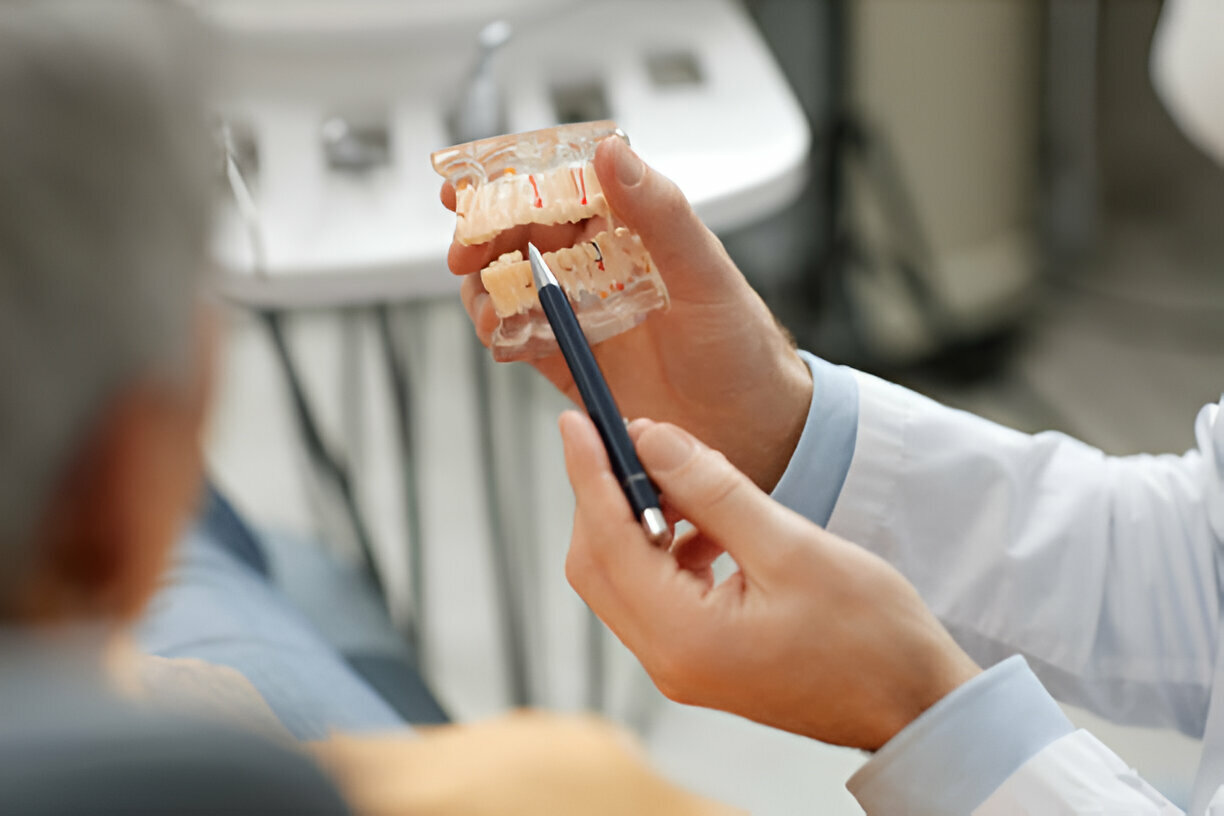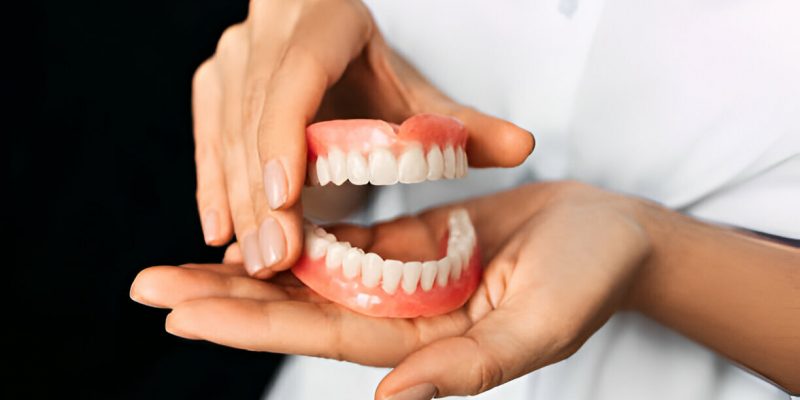Summary:
Do you find yourself amongst 50% of the population dealing with chips, gaps, or missing teeth?
If so, you’re not alone. Many people like you have found a solution in dental dentures to conceal these oral imperfections and regain their confidence.
Dentures in TX are oral appliances that can replace missing teeth and preserve the tissues in your oral cavity. These appliances seamlessly fit into your jaw and can be removed easily.  However, you may have two options upon visiting the dentist: complete and partial dentures. These options can be confusing. Therefore, we have curated this article to examine both dental appliances.
However, you may have two options upon visiting the dentist: complete and partial dentures. These options can be confusing. Therefore, we have curated this article to examine both dental appliances.
We shall delve into topics like:
- Dentures – Your Way To A Captivating Smile
- Complete Dentures vs. Partial Dentures: A Detailed Comparison
- Tips To Streamline Your Decision Between Complete and Partial Dentures
- Are Dentures For Everyone? What Are The Other Alternatives For Tooth Replacement?
In the following sections, continue reading to understand the difference between complete and partial dentures.
Dentures – Your Way To A Captivating Smile
Dentures are oral prosthetics designed to replace lost teeth. They are the best replacement option if you have lost your natural teeth to injury or decay. Besides, they can also be a great option if you are looking for an alternative that can mimic the look and function of natural pearly whites.
Skilled technicians use advanced materials like porcelain, resin, and sometimes a combination to develop sturdy dentures. The process generally begins with dentists in San Antonio, TX, taking your mouth impression to customize the fit of your appliance and ensure optimal comfort.
Complete Dentures vs. Partial Dentures: A Detailed Comparison
Understanding the difference between complete and partial dentures is crucial to making an informed decision when restoring a beautiful smile after tooth loss. Both options offer viable solutions, each with its own set of advantages and considerations.
Let’s delve into a detailed comparison to help you determine which option best suits your needs.
Complete Dentures
Complete or full dentures are designed to replace an entire arch of missing teeth in the upper jaw, lower jaw, or both. They are crafted from durable materials like acrylic or porcelain. Complete dentures provide a natural-looking set of teeth that restore facial aesthetics and chewing function.
They are the best option for:
-
Comprehensive Tooth Replacement
Complete dentures are the go-to option for individuals who have lost all their teeth in one or both dental arches. They provide a complete set of artificial teeth, ensuring a functional and aesthetically pleasing smile.
-
Stability and Adaptation
Adapting to complete dentures may pose discomfort and difficulty speaking or eating. However, the gums adjust to the prosthesis over time, providing stability through suction and muscle control.
-
Maintenance Requirements
Proper care and maintenance are essential for the longevity and hygiene of complete dentures. Daily cleaning, removal for overnight soaking, and regular dental check-ups are necessary to prevent issues like gum irritation and oral infections.
-
Cost Considerations
While complete dentures offer a comprehensive tooth replacement solution, they tend to be more expensive than partial dentures due to their full coverage of the dental arch.
Partial Dentures
Partial dentures are designed to replace one or more missing teeth while preserving remaining natural teeth. They consist of a framework that supports artificial teeth, providing stability and functionality without requiring extensive dental procedures like implants or bridges.
Partial dentures are best suggested for:
-
Preservation of Natural Teeth
One significant advantage of partial dentures is their ability to preserve natural teeth. By filling gaps created by missing teeth, partial dentures prevent adjacent teeth from shifting out of alignment, helping maintain overall oral health and bite integrity.
-
Customization and Aesthetics
Partial dentures can be customized to match the color, shape, and alignment of existing natural teeth, creating a seamless blend with the rest of the smile. This customization enhances aesthetics and boosts confidence in social interactions.
-
Flexibility for Modifications
Unlike complete dentures, which replace entire dental arches, partial dentures offer flexibility for future adjustments. If additional teeth are lost over time, the framework of partial dentures can be modified to accommodate these changes, reducing the need for entirely new prosthetics.
-
Affordability
Partial dentures are generally more cost-effective, making them a budget-friendly option for individuals seeking tooth replacement solutions.
Tips To Streamline Your Decision Between Complete and Partial Dentures
The decision of complete vs. partial dentures depends on several factors, including the extent of tooth loss, oral health condition, budget, and personal preferences. Here are some key considerations to help you make an informed choice:
-
Extent of Tooth Loss:
Evaluate whether you require replacement for all teeth or only a few. Complete dentures are suitable for total tooth loss, while partial dentures are suitable for partial tooth loss scenarios.
-
Oral Health Status:
Consider the condition of your remaining natural teeth and gums. If natural teeth are healthy and viable, partial dentures may be preferable to preserve them and maintain oral function.
-
Aesthetics and Comfort:
Assess how each option aligns with your aesthetic preferences and comfort levels. Complete dentures offer a full set of teeth for comprehensive restoration, while partial dentures blend seamlessly with existing teeth for a natural appearance.
-
Long-Term Planning:
Anticipate any potential changes in your oral health. If you foresee further tooth loss in the future, partial dentures offer the flexibility for future modifications. They can minimize the need for extensive dental procedures later on.
Are Dentures For Everyone? Other Alternatives For Tooth Replacement?
Dental dentures aren’t universally suitable due to variations in individual oral health and preferences. While they offer a removable solution for missing teeth, some individuals may find them uncomfortable or challenging to adapt.  Dentures also require regular maintenance and adjustments. Alternatives include dental implants, which provide a more permanent solution by surgically attaching artificial teeth to the jawbone, and dental bridges, which use adjacent and prosthetic teeth. It’s crucial to consult a dentist to determine the most appropriate option based on individual needs.
Dentures also require regular maintenance and adjustments. Alternatives include dental implants, which provide a more permanent solution by surgically attaching artificial teeth to the jawbone, and dental bridges, which use adjacent and prosthetic teeth. It’s crucial to consult a dentist to determine the most appropriate option based on individual needs.
Takeaway
- Around half the population faces dental issues such as missing teeth or gaps, prompting them to consider dentures as a solution.
- Dentures are dental appliancs that replace missing teeth, restore facial aesthetics, and aid chewing function while preserving oral tissues.
- Complete dentures replace an entire arch of missing teeth, providing comprehensive restoration and facial aesthetics.
- Partial dentures replace one or more missing teeth while preserving natural teeth, offering stability, functionality, and customization options.
- Partial dentures are generally more affordable and offer flexibility for future adjustments, making them a budget-friendly option for tooth replacement.
- Still confused about the possibilities between complete and partial dentures? Allow our experts at Heritage Dental to clear your confusion today!

